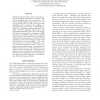Free Online Productivity Tools
i2Speak
i2Symbol
i2OCR
iTex2Img
iWeb2Print
iWeb2Shot
i2Type
iPdf2Split
iPdf2Merge
i2Bopomofo
i2Arabic
i2Style
i2Image
i2PDF
iLatex2Rtf
Sci2ools
98
Voted
AGENTS
1997
Springer
1997
Springer
Adaptable Local Level Arbitration of Behaviors
During the last few years, and in an attempt to provide an ecient alternative to classical methods to designing robot control structures, the behavior-based approach has emerged. Its success has largely been a result of the bottom-up development of a number of fast, tightly coupled control processes. These are speci
cally designed for a particular agent-environment situation. This new approach, however, has some important limitations because of its lack of goaldirectedness (it provides no guarantee to ful
ll the goal) and
exibility (the control is entirely wired and the robot is limited to the behaviors implemented by its designer). In earlier work we presented a model for an architecture that would deal with some of these problems. The architecture bases on two levels of arbitration, a local level which enables the robot to \live" in a particular real world situation, and a global level which ensures that the robot reactions be consistent with the required goal. In this paper ...
Related Content
| Added | 07 Aug 2010 |
| Updated | 07 Aug 2010 |
| Type | Conference |
| Year | 1997 |
| Where | AGENTS |
| Authors | Mohamed Salah Hamdi, Karl Kaiser |
Comments (0)

